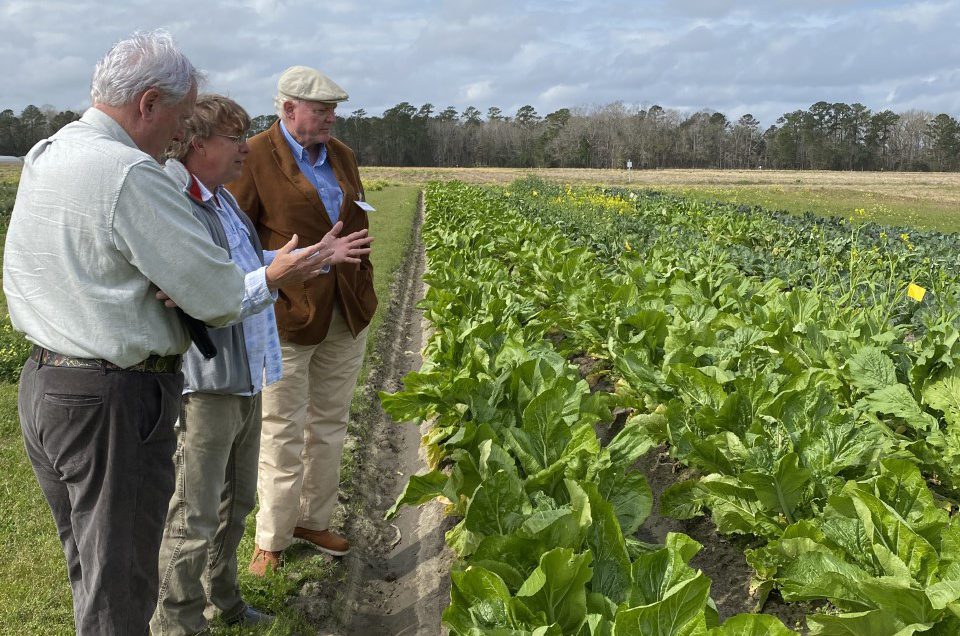Farming is one of South Carolina’s leading industries. It directly contributes to the state’s economy and residents’ health and quality of life. To help South Carolina farmers remain competitive both nationally and globally, McCall Farms is supporting Clemson University with a $3 million contribution for critical research, establishing the McCall Farms Vegetable Breeding Endowment.
Agriculture is part of our DNA at Clemson, and our research helps the more than 25,000 farms located throughout South Carolina in a variety of areas, including specialty crops, responding to weather and environmental changes, modernizing technology and field practices and managing invasive species. I am incredibly grateful to McCall Farms and the Swink family for their generous support of the important work our faculty and staff are doing in vegetable breeding. This donation will make a tremendous impact on farming across the state and beyond.
CLEMSON UNIVERSITY PRESIDENT JIM CLEMENTS
The McCall Farms Vegetable Breeding Endowment will support and enhance the vegetable breeding program within the College of Agriculture, Forestry and Life Sciences (CAFLS), specifically as part of the Advanced Plant Technology (APT) Program. The vegetable breeding program uses genomics-assisted breeding to develop improved vegetable varieties for production in the Southern United States. The APT Program is a statewide network of researchers supporting crop breeding and genetics in the Clemson University Agricultural Experiment Station.
Over the period of its operation, the APT Program, led by Stephen Kresovich, the Robert and Lois Coker Trustees Endowed Chair of Genetics, has made significant advancements to both the intellectual and operational capabilities of the University in crop agriculture. As an example, significant improvements have been made in upgrading the research facilities at the Pee Dee Research and Education Center (REC) as well as other RECs across the state. Meanwhile, Clemson has hired some of the best and brightest new faculty for research positions at the RECs as well as the main campus.
Funds from this endowment will be used to support the research, improve equipment, provide supplies, fund technical personnel salaries and graduate student research assistantships.
While South Carolina farmers are some of the most efficient and productive in the world, this partnership with McCall Farms will be a catalyst for CAFLS’ efforts to provide research, teaching and Extension programs that continue to support the state’s agriculture industry as we tackle the challenge of sustainably feeding a growing state and global population.
CAFLS DEAN KEITH BELLI
According to Sandra Branham, assistant professor of vegetable breeding and genetics, the Southeastern region of the United States plays a significant role in vegetable production in terms of diversity of cropping systems and total quantity for the entire nation. South Carolina has taken a lead role in the region since the founding of the U.S. Department of Agriculture’s Charleston County research lab in 1936. The USDA Lab is co-housed with the Coastal Research and Education Center in Charleston.
“As we seek to expand well-established and emerging markets to improve agricultural profits and crop diversity both locally in South Carolina and regionally in the Southeastern U.S., locally adapted germplasm — particularly heat tolerance and disease resistance — will have to be identified to ensure a sustainable production system,” said Branham.
Current projects in the vegetable breeding program include improving heat tolerance in green beans and disease resistance in leafy greens, muskmelon and watermelon.
Located in Effingham, South Carolina, McCall Farms understands the need for crop diversification and catering to consumer tastes. They established a canning operation in 1954 and work with a network of farmers throughout South Carolina in Cameron, Summerton, Kingstree, Scranton and Coward. With several national brands, including Glory Foods, Margaret Homes, Allens and Peanut Patch, McCall Farms’ Southern-style fruits and vegetables are staples in kitchens across the United States.
McCall Farms is owned by Henry Swink ’68 and Marion Swink ’72 and operated by Woody Swink ’00, McCall Swink ’98 and Thomas Hunter ’06 — all University alumni.
The McCall Farms and Clemson University relationship will further the land-grant mission and continue advancing the field and serve the state of South Carolina with research, training and improved product.
Clemson University and the Advanced Plant Technology Program have established a strong foundation for future collaborations to address targeted problem-oriented research with public- and private-sector partners interested in expanding the quality, sustainability and economic viability of crop agriculture in the state. These collaborations will help reestablish crop agriculture preeminence for the Eastern United States, as it was originally in the earlier history of the nation.
Get in touch and we will connect you with the author or another expert.
Or email us at news@clemson.edu

